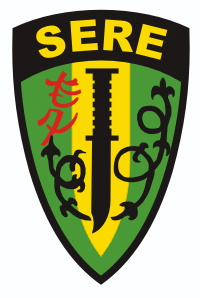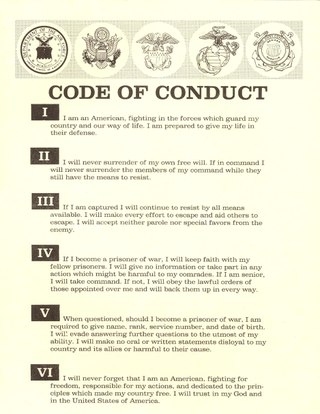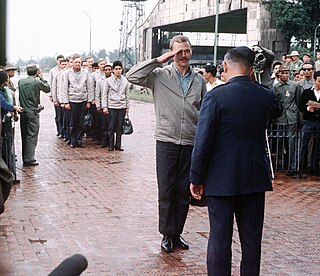POW is "prisoner of war", a person, whether civilian or combatant, who is held in custody by an enemy power during or immediately after an armed conflict.
Contents
POW or pow may also refer to:
POW is "prisoner of war", a person, whether civilian or combatant, who is held in custody by an enemy power during or immediately after an armed conflict.
POW or pow may also refer to:

A prisoner of war (POW) is a person who is held captive by a belligerent power during or immediately after an armed conflict. The earliest recorded usage of the phrase "prisoner of war" dates back to 1610.
Arc may refer to:
Or or OR may refer to:

Hỏa Lò Prison was a prison in Hanoi originally used by the French colonists in Indochina for political prisoners, and later by North Vietnam for U.S. prisoners of war during the Vietnam War. During this later period, it was known to American POWs as the "Hanoi Hilton". Following Operation Homecoming, the prison was used to incarcerate Vietnamese dissidents and other political prisoners, including the poet Nguyễn Chí Thiện. The prison was demolished during the 1990s, although its gatehouse remains a museum.
ID or its variants may refer to:
Me most often refers to:
A boy is a human male child or young man.
Low or LOW or lows, may refer to:
How may refer to:

Survival, Evasion, Resistance, and Escape (SERE) is a training program, best known by its military acronym, that prepares U.S. military personnel, U.S. Department of Defense civilians, and private military contractors to survive and "return with honor" in survival scenarios. The curriculum includes survival skills, evading capture, application of the military code of conduct, and techniques for escape from captivity. Formally established by the U.S. Air Force at the end of World War II and the start of the Cold War, it was extended to the Navy and United States Marine Corps and consolidated within the Air Force during the Korean War (1950–1953) with greater focus on "resistance training".

The Code of the U.S. Fighting Force is a code of conduct that is an ethics guide and a United States Department of Defense directive consisting of six articles to members of the United States Armed Forces, addressing how they should act in combat when they must evade capture, resist while a prisoner or escape from the enemy. It is considered an important part of U.S. military doctrine and tradition, but is not formal military law in the manner of the Uniform Code of Military Justice or public international law, such as the Geneva Conventions.
Reckless may refer to:
The tap code, sometimes called the knock code, is a way to encode text messages on a letter-by-letter basis in a very simple way. The message is transmitted using a series of tap sounds, hence its name.
6B or 6b or VI-B may refer to :
Big or BIG may refer to:

Operation Homecoming was the return of 591 American prisoners of war (POWs) held by North Vietnam following the Paris Peace Accords that ended U.S. involvement in the Vietnam War.
A pow wow is a gathering of Native Americans.
The early life and military career of John Sidney McCain III spans the first forty-five years of his life (1936–1981). McCain's father and grandfather were admirals in the United States Navy. McCain was born on August 29, 1936, in the Panama Canal Zone, and attended many schools growing up as his family moved among naval facilities. McCain graduated from the United States Naval Academy in 1958. He married the former Carol Shepp in 1965; he adopted two children from her previous marriage and they had another child together.
A prisoner of war is a person, whether combatant or non-combatant, who is held in custody by an enemy power during or immediately after an armed conflict.
Members of the United States armed forces were held as prisoners of war (POWs) in significant numbers during the Vietnam War from 1964 to 1973. Unlike U.S. service members captured in World War II and the Korean War, who were mostly enlisted troops, the overwhelming majority of Vietnam-era POWs were officers, most of them Navy, Air Force, and Marine Corps airmen; a relatively small number of Army enlisted personnel were also captured, as well as one enlisted Navy seaman, Petty Officer Doug Hegdahl, who fell overboard from a naval vessel. Most U.S. prisoners were captured and held in North Vietnam by the People's Army of Vietnam (PAVN); a much smaller number were captured in the south and held by the Việt Cộng (VC). A handful of U.S. civilians were also held captive during the war.